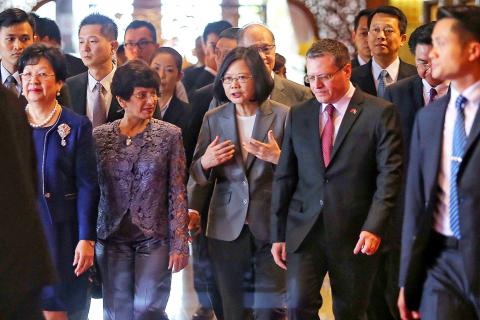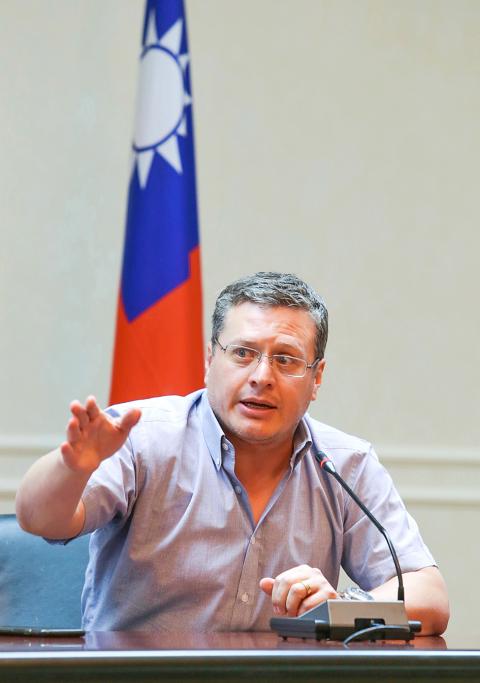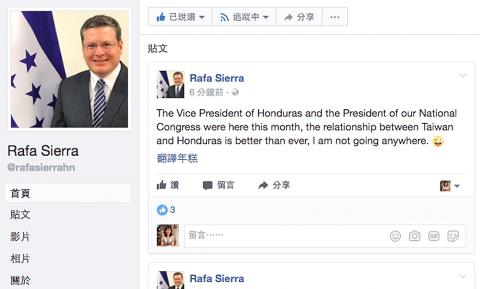It didn’t take long for Honduran Ambassador, Rafael Fernando Sierra Quesada, to make a name for himself in Taiwan — just not the way he expected.
A few months into his posting in 2015, Sierra was involved in an alleged hit-and-run when a 15-year old riding a scooter slammed into his car. Further investigation concluded that the teenager violated traffic rules and was riding without a license. However, the handling of the situation led to a misunderstanding that brought a lot of attention to the diplomat and his country.
“The accident was all over the news in both Taiwan and Honduras, but I believe that everything happens for a reason, and this incident somehow turned into something positive,” Sierra told the Taipei Times earlier this month.

Photo: CNA, Syu Jhao-Chang
Sierra said the incident attracted so much attention in Taiwan that he become a minor celebrity, with Taiwanese often recognizing him and calling out his name on the street. Since then, Sierra quipped, he’s found more positive ways to attract people to Honduras.
Sierra said he has spent much of his Taiwan stint promoting people-to-people relations between the two nations. He says this approach goes beyond administrations that change every four years and strengthens the now 76-year long diplomatic relationship between the two countries.
“I always tell everyone: the best thing about Taiwan is its people,” he said.

Photo: CNA, Pei Jhen
He recalls a time shortly after arriving in the country when he found himself lost and a Taiwanese man guided him to the nearest MRT station. Sierra said that in that moment he understood that for this man, simply telling him was not enough, he needed to go the extra mile.
Sierra said that Taiwan is a great friend to Honduras and that their impact on Honduran development has been very positive due to their contribution to education, infrastructure and specialized professional training.
One example of successful Taiwan-Honduras collaboration, according to the ambassador, is the tilapia farms that Taiwan helped improve, resulting in Honduras becoming the biggest exporter of the fish to the US.

Photo courtesy of rafa sierra
According to the Honduran Ministry of Economic Development, exports to Taiwan have seen a 64 percent increase in recent months, specifically in shrimp, coffee and beef. Honduran melon, an industry that employs 68,000 Hondurans directly and indirectly, is expected to enter the market between next month and January.
Sierra has also been promoting business cooperation between the nations and has already encouraged over 30 Taiwanese businesses to visit Honduras.
CREATING COMMUNITY
“It is teamwork,” Sierra said, referring to the collective efforts of President Tsai Ing-wen (蔡英文) and Honduran President Juan Orlando Hernandez, the Ministry of Foreign Affairs, the International Cooperation and Development Fund and the Central American Trade Office.
It was recently announced that Ingrid Hsing (邢瀛輝) will be serving as Taiwan’s Ambassador to Honduras and Sierra said that “they will make a good team, working for the benefit of both nations.”
There are over 300 Hondurans currently living in Taiwan. One of the ambassador’s priorities is to create a sense of community among the expats.
“Communication is very important, that is why I try to stay active on social media,” Sierra added. He said that he tries to tweet often about matters concerning Taiwan-Honduras relations, Honduran products that have entered the market, merits awarded to Hondurans in Taiwan, among other issues that could interest the community.
“I am a civil servant and everything we do here, people need to know about it,” he said.
Recognizing the increasing influence of Beijing in Central America, Sierra said that it “creates pressure in Honduras,” but believes that economic benefits are not the most important for the nation.

In the March 9 edition of the Taipei Times a piece by Ninon Godefroy ran with the headine “The quiet, gentle rhythm of Taiwan.” It started with the line “Taiwan is a small, humble place. There is no Eiffel Tower, no pyramids — no singular attraction that draws the world’s attention.” I laughed out loud at that. This was out of no disrespect for the author or the piece, which made some interesting analogies and good points about how both Din Tai Fung’s and Taiwan Semiconductor Manufacturing Co’s (TSMC, 台積電) meticulous attention to detail and quality are not quite up to

April 21 to April 27 Hsieh Er’s (謝娥) political fortunes were rising fast after she got out of jail and joined the Chinese Nationalist Party (KMT) in December 1945. Not only did she hold key positions in various committees, she was elected the only woman on the Taipei City Council and headed to Nanjing in 1946 as the sole Taiwanese female representative to the National Constituent Assembly. With the support of first lady Soong May-ling (宋美齡), she started the Taipei Women’s Association and Taiwan Provincial Women’s Association, where she

Chinese Nationalist Party (KMT) Chairman Eric Chu (朱立倫) hatched a bold plan to charge forward and seize the initiative when he held a protest in front of the Taipei City Prosecutors’ Office. Though risky, because illegal, its success would help tackle at least six problems facing both himself and the KMT. What he did not see coming was Taipei Mayor Chiang Wan-an (將萬安) tripping him up out of the gate. In spite of Chu being the most consequential and successful KMT chairman since the early 2010s — arguably saving the party from financial ruin and restoring its electoral viability —

It is one of the more remarkable facts of Taiwan history that it was never occupied or claimed by any of the numerous kingdoms of southern China — Han or otherwise — that lay just across the water from it. None of their brilliant ministers ever discovered that Taiwan was a “core interest” of the state whose annexation was “inevitable.” As Paul Kua notes in an excellent monograph laying out how the Portuguese gave Taiwan the name “Formosa,” the first Europeans to express an interest in occupying Taiwan were the Spanish. Tonio Andrade in his seminal work, How Taiwan Became Chinese,